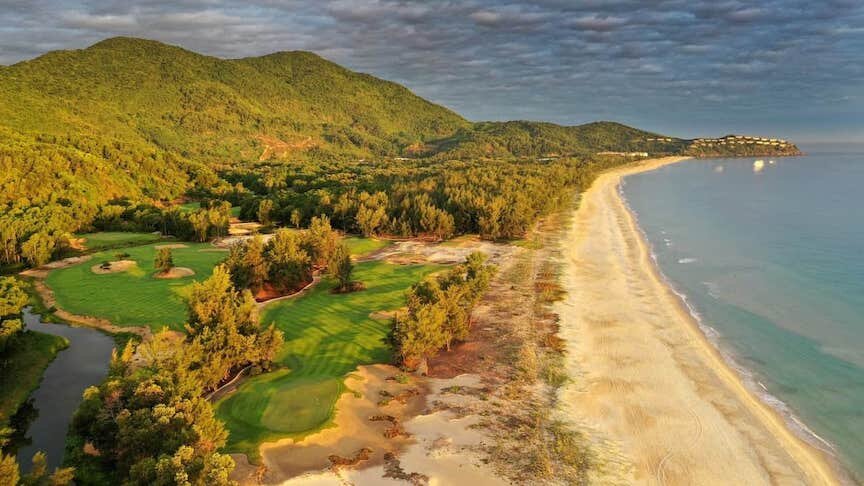How the Most Sustainable Golf Facility in Vietnam Plans to Spread Its Impact: Might this model apply in the US?
Little known to the Western World, Laguna Lăng Cô Golf Club of Vietnam represents a leading example of sustainable and even regenerative golf design. This “edible” golf design of Nick Faldo and Paul Jansen restored 5 hectares of fallow rice paddy in its conception. This rice paddy feature is tended by water buffalo, and adds a “sense of place” to the golfer’s journey. Now owned, operated, and consumed by locals, the site also produces up to 20 tons of rice from two harvests every year (1). By improving the productivity of the land while enhancing the golfing experience, the course offers an example of eco-friendly and community-driven golf perhaps rivaled only by its siblings Laguna Phuket (Thailand) and Laguna Bintan (Indonesia) in Southeast Asia.
Laguna Lăng Cô has also placed a moratorium on single-use plastics and is one of just three golf courses in the world to have achieved EarthCheck Gold Certification -- a leading environmental certification and benchmarking program for the travel and tourism industry (1).
Why rest there? Laguna Lăng Cô doesn’t plan to. Late in 2020, it announced “Greater Good Grants” developed through parent company Banyan Tree Group. The sustainability grants will spread the positive impact of the operation by allocating up to $10,000 to projects in each of six key areas that align with the UN’s Sustainable Development Goals (2):
Biodiversity & Conservation
Resource Use & Waste Management
Climate Change & Resilience
Education & Empowerment
Health & Well-Being
Protection & Stewardship of Culture and Livelihoods
Submissions are to be reviewed by Banyan Tree’s board of directors and a panel of internal stakeholders in Q1 of 2021 (3). The resort management company’s approach typically offers grants to projects within the local operating vicinity, but also invites a wide variety of stakeholders to apply, including NGOs and academics in this case. Qualified individuals had to be 18 or older with an organizational affiliation.
Could this success story signal a new model in which management-owned golf courses spread their positive impact through a “trickle upward” that influences the sustainability investments of the much larger parent company?
With recent news of further industry consolidation -- golf course management company Troon purchased Indigo Golf Partners (formerly Billy Casper) on Jan. 4, 2021 -- one hopes that such changes can find roots in the West.
With over 630+ 18-hole equivalent golf courses across the US, Troon could affect change via similar sustainability grants in a variety of geographies surrounding its operations. The recent Indigo buyout may be as much due to shared values as to economic gain, since both Troon and Indigo have espoused commitments to sustainability and inclusivity for many years.
In recent press releases, Indigo in particular cites its intention to “leave the industry better than (they) found it” (4). Vietnam’s Laguna Lăng Cô represents a golf course already doing exactly that, and securing its bottom line in the process.
Sources:
https://www.gaiadiscovery.com/latest-places/laguna-lng-c-buffalo-powered-golf
https://www.edgeprop.sg/property-news/banyan-tree-global-foundation-launches-sustainability-grants
https://www.planetgolf.com/news/laguna-lang-co-works-towards-the-greater-good
https://www.troon.com/press-releases/troon-acquires-indigo-golf-partners/
Photo Sources:
https://www.golfcourseindustry.com/article/laguna-golf-lang-co-vietnam-nick-faldo/


